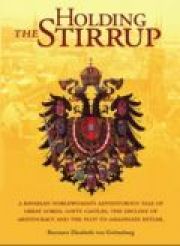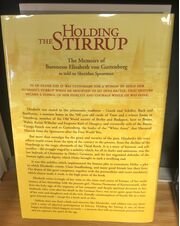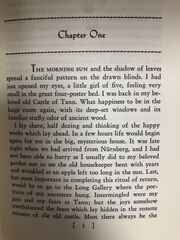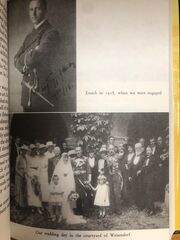By Baroness Elisabeth von Guttenberg
In an older day it was customary for a woman to hold her husband's stirrup when he mounted to go into battle. That gesture became a symbol of her fidelity and courage while he was gone.
Baroness Elisabeth von Guttenberg, daughter of the General Baron von der Tann-Rathsamhausen of Bavaria and the Countess Emma Mikes of Hungary, for several years held the stirrup for her husband, who died in his lifelong fight against the evils of Hitler and of Communism.
Elisabeth was reared in the aristocratic tradition - Goeth and Schiller, Bach and Beethoven, a summer home in the 500 year old castle of Tann and a winter home in Nurnberg, member of the Old World society of Berlin and Budapest, host to Bruno Walter, Kaiser Wilhelm and Emperor Karl of Hungary and eventually wife of the Baron George-Enoch von und zu Guttenberg, the leader of the "White Army" that liberated Munich from the Spartacists after the first World War.
But more than nostalgia for the grace and security of the past, Elisabeth's life story reflects world events from the turn of the century to the present, from the decline of the Hapsburgs to the tragic aftermath of the Third Reich. It is a story of heroism and self-sacrifice - the struggle waged by a nobility which, for all its faults and omissions, was the last bulwark of Christianity in Hitler's Germany, and the last organized defender of the human rights and dignity which Hitler brought to such a terrifying end.
It was this nobility which implemented the famous plot to assassinate Hitler, a plot in which Elisabeth's cousin, Claus Stauffenberg, and many good friends lost their lives. The drama of this great conspiracy, together with the personalities and secret machinery which almost made it work, is the high point of the book.
Elisabeth writes lovingly of her visits to the cities and courts of Europe; of her castle homes; of her friendship with the peasant girl, Theresa Neumann Konnersreuth, who bore the holy sign of the stigmata; of her romantic and deeply spiritual devotion to her husband, who, even after his death in the German Navy, was never quite apart form her; of her sons and daughter and of the rich, friendly commonplaces of family life in a time gone beyond recall - except for a book such as this.
This graceful and Christian memoir, by a daughter of the German aristocracy, is a fond testimonial to a way of life that was critically wounded at Sarajevo and met its death at the hands of Hitler.
Seldom does one find a faith and sincerity like Elisabeth's, and seldom can one share such a sense of physical participation in history. Holding the Stirrup is one of those happy accidents which happen so rarely - a memoir that tells an intensely personal story and yet captures the spirit of the age.
Hardcover, 269 Pages
No posts found







